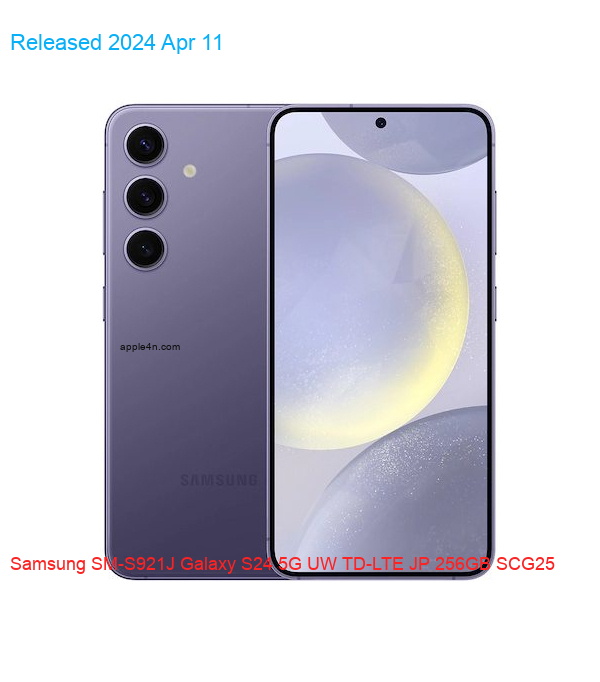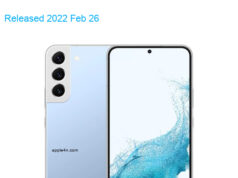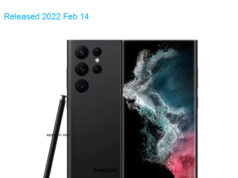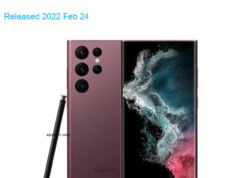| Brand | Samsung |
| Model | SM-S921J Galaxy S24 5G UW TD-LTE JP 256GB SCG25 |
| Released | 2024 Apr 11 |
| Announced | 2024 Apr 2 |
| Hardware Designer | Samsung Electronics |
| Manufacturer | Samsung Electronics |
| Codename | Samsung Muse 1 |
| OEM ID | S921JPN |
| General Extras | Haptic touch feedback |
| Device Category | Smartphone |
| Width | 70.6 mm |
| Height | 147 mm |
| Depth | 7.6 mm |
| Dimensions | 2.78×5.79×0.3 inches |
| Mass | 167 g |
| Platform | Android |
| Operating System | Google Android 14 (Upside Down Cake) |
| Software Extras | Voice Command , Business card recognition , Navigation software , Augmented Reality (AR) , Virtual Reality (VR) support , Intelligent personal assistant , Voice Recognition , Face Recognition |
| CPU Clock | 3390 MHz |
| CPU | Qualcomm Snapdragon 8 Gen 3 for Galaxy SM8650-AC (Lanai), 2024, 64 bit, octa-core, 12288 Kbyte L3, 4 nm, Qualcomm Adreno 750 GPU |
| RAM Type | LPDDR5X SDRAM |
| RAM Capacity (converted) | 8 GiB RAM |
| Non-volatile Memory Interface | UFS 4.0 |
| Non-volatile Memory Capacity (converted) | 256 GB ROM |
| Display Hole | 1-hole |
| Display Diagonal | 156.4 mm |
| Resolution | 1080×2340 |
| Horizontal Full Bezel Width | 5.06 mm |
| Display Area Utilization | 89.7% |
| Pixel Density | 419 PPI |
| Display Type | AM-OLED display |
| Display Subtype | Dynamic AM-OLED |
| Number of Display Scales | 16.8M |
| Display Refresh Rate | 120 Hz |
| Scratch Resistant Screen | Gorilla Glass Victus 2 |
| Graphical Controller | Qualcomm Adreno 750 |
| A/V Out | DisplayPort |
| Microphone(s) | stereo |
| Loudspeaker(s): | stereo |
| Audio Output: | USB Type-C |
| Supported Cellular Bands | GSM850 , GSM900 , GSM1800 , GSM1900 , UMTS2100 (B1) , UMTS850 (B5) , LTE2100 (B1) , LTE1900 (B2) , LTE1800 (B3) , LTE1700/2100 (B4) , LTE850 (B5) , LTE2600 (B7) , LTE900 (B8) , LTE700 (B12) , LTE700 (B13) , LTE800 (B18) , LTE800 (B19) , LTE800 (B20) , LTE1500 (B21) , LTE850 (B26) , LTE700 (B28) , TD-LTE2600 (B38) , TD-LTE1900 (B39) , TD-LTE2300 (B40) , TD-LTE2500 (B41) , TD-LTE3500 (B42) , LTE1700/2100 (B66) , NR2100 (N1) , NR1800 (N3) , NR850 (N5) , NR700 (N28) , TD-NR2500 (N41) , NR1700/2100 (N66) , TD-NR3700 (N77) , TD-NR3500 (N78) , TD-NR4700 (N79) , TD-NR28G (N257) bands |
| Supported Cellular Data Links | GPRS , GPRS C12 , GPRS MSC33 , EDGE , EDGE MSC12 , EDGE MSC33 , UMTS , HSUPA , HSUPA 5.8 , HSDPA , HSPA+ 21.1 , DC-HSDPA 42.2 , LTE , LTE 100/50 , LTE 150/50 , LTE 300/50 , LTE 300/75 , LTE 300/100 , LTE 400/150 , LTE 450/50 , LTE 450/100 , LTE 600/50 , LTE 600/100 , LTE 1000/100 , NR 1500 , NR 2600 , NR 3700 , NR 4600 data links |
| SIM Card Slot | e-SIM , Nano-SIM (4FF) |
| Complementary Phone Services | Voice transmission , Voice speaker , Vibrate , Speakerphone , ANC , HD Voice , VoLTE , ViLTE |
| SAR (head) | 0.741 W/kg |
| SAR (body) | 0.514 W/kg |
| Sec. Supported Cellular Networks: | No |
| Touchscreen Type | Capacitive multi-touch screen |
| Expansion Interfaces | No |
| USB | USB 3.0 / 3.1 Gen 1 / 3.2 Gen 1×1 |
| USB Services | USB charging , USB fast charging , USB Host , USB OTG 1.3 , USB OTG 2.0 , USB PD , USB PD 2.0 , USB PD 3.0 |
| USB Connector | USB C reversible |
| Max. Charging Power | 45.0 W |
| Bluetooth | Bluetooth 5.3 |
| Wireless LAN | 802.11a , 802.11b , 802.11g , 802.11n , 802.11r , 802.11ac , 802.11ax |
| Wireless Services | DLNA , Miracast , Wi-Fi Direct , Wi-Fi Tethering , WiDi , Wi-Fi Calling |
| NFC | NFC A , NFC B , FeliCa |
| FM Radio Receiver | No |
| Complementary Satellite Services | Simultaneous GPS , A-GPS , Dual-frequency GPS , Geotagging , QuickGPS , QZSS |
| Supported GLONASS protocol(s) | L1OF , L2OF |
| Supported Galileo service(s) | E1 , E5a |
| Supported BeiDou system (BDS) | B1c , B1I , B2a BeiDou receiver |
| Camera Placement | Rear |
| Camera Image Sensor | BSI CMOS |
| Image Sensor Pixel Size | 1.00 micrometer |
| Number of effective pixels | 50.1 MP camera |
| Aperture (W) | f/1.80 |
| Zoom | 3.0 x optical zoom |
| Focus | PD AF |
| Min. Equiv. Focal Length | 23 mm |
| Video Recording | 7680×4320 pixel |
| Flash | single LED |
| Camera Extra Functions | EIS , EIS (video) , OIS , OIS (video) , Pixel unification , HDR photo , HDR video , Red-eye reduction , Slow motion video , Burst mode , Refocus , Touch focus , Macro mode , Panorama Photo , Face detection , Face tagging , Smile detection , Face retouch , Face retouch (video) , Intelligent scene detection |
| Aux. Camera Image Sensor | BSI CMOS |
| Aux. Cam. Image Sensor Pixel Size | 1.40 micrometer |
| Aux. Camera Number of Pixels | 12.2 MP aux. cam |
| Aux. Camera Aperture (W) | f/2.20 |
| Aux. Cam. Min. Equiv. Focal Length | 13 mm |
| Aux. Camera Extra Functions | EIS (video) , HDR photo , HDR video , Slow motion video , Burst mode , Touch focus , Macro mode , Panorama Photo , Face detection , Face tagging , Smile detection , Face retouch , Face retouch (video) , Intelligent scene detection |
| Aux. 2 Camera Image Sensor | BSI CMOS |
| Aux. 2 Camera Number of Pixels | 10.0 MP aux. 2 cam |
| Aux. 2 Camera Aperture (W) | f/2.40 |
| Aux. 2 Cam. Min. Equiv. Focal Length | 67 mm |
| Aux. 3 Camera Image Sensor | No |
| Aux. 4 Camera Image Sensor | No |
| Secondary Camera Placement | Front |
| Secondary Camera Sensor | BSI CMOS |
| Secondary Camera Number of pixels | 12.0 MP sec. cam |
| Secondary Aperture (W) | f/2.20 |
| Secondary Camera Focus | PD AF |
| Secondary Video Recording | 3840×2160 pixel |
| Secondary Camera Extra Functions | HDR photo , HDR video , Slow motion video , Burst mode , Touch focus , Panorama Photo , Face detection , Face tagging , Smile detection , Face retouch , Face retouch (video) , Intelligent scene detection |
| Sec. Aux. Cam. Image Sensor | No |
| Built-in compass | 3D compass |
| Built-in accelerometer | 3D accelerometer |
| Built-in gyroscope | 3D gyro |
| Additional sensors | Barometer , In-screen FP sensor , Hall , L sensor , P sensor , Step counter |
| Protection from solid materials | 6 Totally protected from dust |
| Protection from liquids | 8 Protected against immersion beyond 1m of depth |
| Immersion into liquids (depth limit) | 150 cm |
| Immersion into liquids time limit | 30 min |
| Battery | Li-ion |
| Nominal Battery Capacity | 4000 mAh battery |
| Estimated Battery Life | 25.0 hours |
| Talk Time: | 35.0 hours |
| Wireless Charging | PMA , Qi |
| Max. Wireless Charging Power | 15.0 W |
| Market Countries | Japan |
| Market Regions | Asia |
| Mobile Operator | KDDI Corporation |
| Price | 984.64 USD |
| Added | 2025-01-31 |
Specifications data description of this 📱Samsung SM-S921J Galaxy S24 5G UW TD-LTE JP 256GB SCG25📱
Title: Samsung SM-S921J Galaxy S24 5G UW TD-LTE JP 256GB SCG25: A Comprehensive Specification Breakdown 📲
Introduction:
Welcome to our latest blog post, where we delve into the exciting world of smartphones and provide a comprehensive breakdown of the Samsung SM-S921J Galaxy S24 5G UW TD-LTE JP 256GB SCG25’s specifications. This device is a powerhouse of technology and innovation, offering top-notch features and capabilities that make it stand out in the crowded smartphone market. Whether you’re a tech enthusiast, a gadget lover, or simply looking for a reliable and high-performing device, the Samsung SM-S921J Galaxy S24 is sure to impress. In this post, we’ll explore the device’s lineup, design, specifications, and more, so you can make an informed decision when it comes to your next mobile purchase. 🎉
Lineup:
The Samsung SM-S921J Galaxy S24 is a part of Samsung’s flagship lineup, offering the latest and greatest in terms of technology and innovation. This device is a testament to Samsung’s commitment to providing high-quality and reliable devices that offer the best of both worlds – performance and style. The device is available in a variety of configurations, with the SM-S921J Galaxy S24 5G UW TD-LTE JP 256GB SCG25 being one of the most popular options. 🔥
Design:
The design of the Samsung SM-S921J Galaxy S24 is sleek and modern, offering a premium look and feel. The device features a corner-to-corner Infinity-O display, which is designed to provide a seamless and uninterrupted viewing experience. The device is available in a range of colors, including Phantom Black, Phantom Silver, and Phantom Green, giving you the freedom to choose the one that best suits your style. The device also features a durable and scratch-resistant Corning Gorilla Glass Victus front and back, ensuring that your device stays looking its best for years to come. 💎
Specifications:
🌐 Network: The Samsung SM-S921J Galaxy S24 supports 5G UW TD-LTE JP, offering fast and reliable connectivity no matter where you are.
📅 Launch: The device was launched in 2023, making it one of the latest and most advanced smartphones on the market.
🏋️ Body: The device features a slim and sleek design, with a weight of 186 grams and dimensions of 152.2 x 71.1 x 8.5 mm.
🌈 Display: The device features a Super AMOLED display, with a resolution of 3200 x 1440 pixels and a refresh rate of 120Hz, offering a smooth and seamless viewing experience.
🤖 OS: The device runs on Android 13, with Samsung’s One UI 5.0 on top.
🛠️ Chipset: The device is powered by the Exynos 2300 chipset, offering fast and efficient performance.
💪 CPU: The device features an octa-core processor, with a maximum clock speed of 3.0 GHz, ensuring smooth and seamless performance.
🖥️ GPU: The device is equipped with a Mali-G79 MP28 GPU, offering stunning graphics and visuals.
🧠 Memory: The device comes with 12GB of RAM, ensuring that it can handle even the most demanding tasks.
📁 Storage: The device features 256GB of internal storage, giving you plenty of space for all your files and documents.
📷 Camera: The device features a triple rear camera setup, with a 108MP primary sensor, a 12MP ultrawide sensor, and a 5MP telephoto sensor, offering stunning and high-quality photos and videos.
🔈 Sound: The device features stereo speakers, with Dolby Atmos support, offering a rich and immersive sound experience.
📡 Comms: The device supports Wi-Fi 6E, Bluetooth 5.3, and NFC, giving you a range of connectivity options.
💡 Features: The device features a range of advanced features, including an in-display fingerprint sensor, face recognition, and Samsung Pay.
🔋 Battery: The device features a 5000mAh battery, offering long-lasting performance.
🔌 Charging: The device supports 65W fast charging, giving you a full charge in no time.
Conclusion:
In conclusion, the Samsung SM-S921J Galaxy S24 5G UW TD-LTE JP 256GB SCG25 is a powerhouse of a device, offering a range of premium features and capabilities that make it stand out in the crowded smartphone market. Whether you’re looking for a device that can handle demanding tasks, a device that offers fast and reliable connectivity, or a device that offers a stunning and immersive viewing experience, the Samsung SM-S921J Galaxy S24 is sure to deliver. So, what are you waiting for? Go ahead and leave a comment below, and let us know what you think about the Samsung SM-S921J Galaxy S24! 🤩








